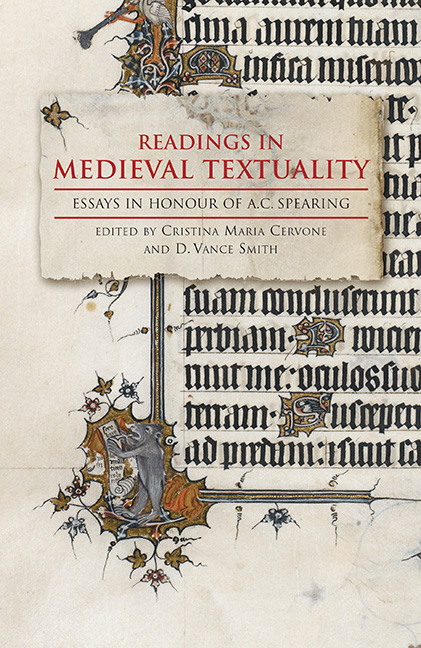Book contents
- Frontmatter
- Contents
- List of Illustrations
- List of Contributors
- A. C. Spearing's Work and Influence
- Bibliography of A. C. Spearing's Works
- I Reading Experience and Experientiality
- II Revisions and Re-visioning of Alliterative Poetry
- III Subjectivity and the Self
- IV Reading for Form
- V Epilogue
- 13 Two Appreciations of A. C. Spearing
- 14 Announcing a Literary Find Apparently Related to the Gawain-poet
- Works Cited
- Index
- Tabula Gratulatoria
14 - Announcing a Literary Find Apparently Related to the Gawain-poet
from V - Epilogue
Published online by Cambridge University Press: 25 October 2017
- Frontmatter
- Contents
- List of Illustrations
- List of Contributors
- A. C. Spearing's Work and Influence
- Bibliography of A. C. Spearing's Works
- I Reading Experience and Experientiality
- II Revisions and Re-visioning of Alliterative Poetry
- III Subjectivity and the Self
- IV Reading for Form
- V Epilogue
- 13 Two Appreciations of A. C. Spearing
- 14 Announcing a Literary Find Apparently Related to the Gawain-poet
- Works Cited
- Index
- Tabula Gratulatoria
Summary
In the course of preparing this volume, the editors received a transcription of some fragmentary verses. They were sent by a scholar from Cambridge, the apparent site of the story related in this most interesting early poem. The copy we obtained appears to be of very recent vintage, perhaps from the middle part of the twentieth century, around about 1956 or 1957. It has struck us that the story seems to have certain affinities with another brief fragment that by chance has since come into our hands. Examining the verse structure closely, and taking into account prominent dialectical features, we have formed the opinion that these are two sections of the same fourteenth-century poem, previously unrecorded and nowhere accounted for in scholarship on the period. It may be, however, that the second fragment is by a slightly later, somewhat cavalier hand, perhaps even a pupil of the first poet. It seems wholly appropriate that they should appear for the first time together. Having examined both manuscripts carefully, we initially thought that perhaps the letters “ACS” and “c.m.” scribbled in the margins might help in attribution of this poem, even though our original describes the first verses as “apparently by the Gawain-poet.” We have since, however, tentatively conjectured that these letters, even if they are initials, represent scribal activity, perhaps pen tests, possibly of use in determining provenance. It is our hope that the author of these verses, or at least of the earlier ones, should be discovered and properly acclaimed. Given the subject matter of the first fragment, which includes a description of a terrifying beautiful lady uncannily similar to the great scholar, Elizabeth Salter, we surmise that the early verses at least could have been written by a precocious Cambridge student of considerable brilliance – someone witty, and, like the Gawain-poet, a keen and humane observer of human behavior. What better place for them to be published than in this celebration of the scholar who put the work of the Gawain-poet on the map?
- Type
- Chapter
- Information
- Readings in Medieval TextualityEssays in Honour of A.C. Spearing, pp. 219 - 222Publisher: Boydell & BrewerPrint publication year: 2016



